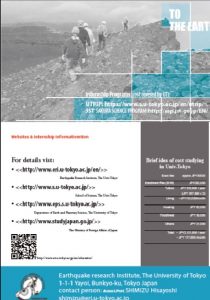Graduate School Education
The Earthquake Research Institute (ERI) was established in 1925, two years after the Great Kanto Earthquake. When ERI celebrated its 10th anniversary, Torahiko Terada, a physicist, essayist, and an ERI researcher, commented as follows: “The eternal mission of ERI is for scientific research of various phenomena associated with earthquakes, and for the exploration of measures to prevent and reduce disasters attributed directly or indirectly to earthquakes.”
Eighty-odd years have passed since the foundation of ERI, but this spirit is still alive and well. ERI employs over 80 top-notch academics (professors, associate professors and research associates) drawn from diverse fields, ranging from seismology to volcanology, geophysics, geochemistry, geology, geodesy, applied mathematics, information science, civil engineering and seismic engineering. Together with 50 supoprting staff, 30 visiting researchers and 70 graduate students, we work on advanced research, technique development, field observations, experiments, theoretical studies, analyses and computer simulations.
ERI accepts graduate students and researchers from the following school/departments: the Department of Earth and Planetary Science(Graduate School of Science) , the Department of Civil Engineering, the Department of Architecture (Graduate School of Engineering), Graduate School of Interfaculty Initiative Information Studies, and the Department of Complexity Science and Engineering (Graduate School of Frontier Sciences).
Also, professors who belong to ERI are deeply involved in graduate programs of each major, giving lectures and research guidance. Graduate students at ERI enjoy the advanced field and laboratory work with their supervisors. Through such experiences, graduate students will feel a “breath” of the Earth that they may not feel from textbooks. ERI also accepts researchers from other institutes and abroad, offering them the same type of education that graduate students take, and an opportunity to participate in research. We will continue to promote education characterized by the above features in collaboration with graduate schools of the University of Tokyo.
ERI offers an excellent education program, and you will find our research themes and techniques interesting. We welcome those of you who take interest in earthquakes, volcanoes and other earth-related phenomena, as well as those who are enthusiastic about making new discoveries.
Dear students interested in studying at our institute
ERI has been receiving many students from all over the world for doing their Master’s degree and PhD in the field of seismology, volcanology, tsunami and earth interior physics.
If you are interested in studying at our institute, here’s a quick information on how you could apply and where you can find details.

■Studyin at ERI 2017 (pdf 5.4M) TBA for 2021
■Studying in ERI: Question & Answers (pdf 73.2kb)
■Contact form
ERI International Office: http://www.eri.u-tokyo.ac.jp/kokusai/english/index.html

